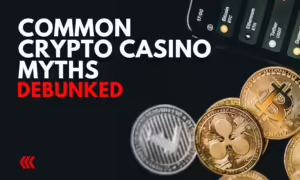Debunking 5 Common Myths About Crypto Casinos
What are the biggest myths about crypto casinos, and how true are they? Discover the reality behind these misconceptions here.

In today’s digital age, crypto casinos have become a major part of online gaming, attracting both experienced gamblers and newcomers. Yet, alongside this growth, several myths and misconceptions about crypto casinos persist. In this article, we’ll look at some of the 5 common myths about crypto casinos and set the record straight, so you can decide for yourself whether these platforms are worth a try.
Myth 1: “Crypto Gambling Fees Are Very Expensive”
One common perception is that using cryptocurrencies in casinos incurs high fees. This notion often stems from how Bitcoin transaction fees are calculated, which can range from $1 to $20 depending on network traffic. In contrast, many altcoins offer significantly lower fees. For example, Monero (XMR) averages about $0.02 per transaction, and Litecoin fees range from $0.01 to $0.10. Stellar (XLM) is even cheaper, with fees as low as 0.00001 XLM (under $0.00001 USD).
These altcoins are widely used in crypto casinos to minimize transaction costs for both the casino and the player, ensuring cost-effective transactions. Moreover, some crypto casinos even incentivize players with reduced fees and crypto bonuses, further enhancing the benefits of using crypto for transactions.
It’s also important to note that fees exist to compensate miners and validators who secure the network and validate transactions—essential for maintaining blockchain integrity. However, while Bitcoin can have higher fees during peak times, the choice of cryptocurrency can help players manage costs effectively.
Myth 2: “Crypto Casinos Lack Fairness and Transparency”
Another myth that deters some players from crypto casinos is the belief that these platforms are not fair or transparent. In reality, the opposite is often true. Many crypto casinos employ provably fair algorithms, a blockchain-based technology that lets players verify each game’s outcome. Through these algorithms, players can see exactly how results are generated, ensuring no manipulation.
Additionally, some crypto casinos even provide guides explaining their fairness protocols, reassuring players of transparent practices. However, not all crypto casinos implement these algorithms, with some operating with limited transparency, similar to traditional casinos. Even so, blockchain technology remains integral to crypto casinos, enhancing trust and providing transparency beyond what traditional casinos offer.

Myth 3: “Crypto Casinos Are Linked to Money Laundering”
Another myth is that crypto casinos are primarily used for money laundering. This misconception arises from the association of cash with illicit activities. While it’s true that some criminals may attempt to use crypto for illegal activities, crypto casinos are subject to strict regulations to prevent such occurrences. Crypto casinos must follow KYC (Know Your Customer) and AML (Anti-Money Laundering) procedures.
This means players are required to provide identification and undergo checks to ensure they haven’t engaged in illicit activities. These platforms also monitor transactions to detect suspicious behavior, helping to maintain a safe gambling environment. It’s essential to understand that while risks exist, crypto casinos take significant measures to comply with regulations and ensure fair play, similar to how traditional casinos operate.
Myth 4: “Crypto Casinos Offer Complete Anonymity”
While crypto casinos offer more privacy compared to traditional banking, assuming that all transactions are completely anonymous is misleading. Bitcoin, for instance, operates on a public blockchain, meaning that all transactions are recorded and accessible to anyone. Although these transactions don’t reveal personal details, they are pseudonymous, not anonymous. In other words, you may not see names, but wallet addresses and transaction details are traceable.
In practice, different anonymous crypto casinos have varying privacy policies. Some only require minimal information, like an email address, while others may need more verification for larger transactions. As a result, true anonymity is limited, as most casinos prioritize compliance and security over untraceable transactions. If privacy is a top concern, be sure to review each casino’s policies to understand their approach to user privacy and data security.
Myth 5: “Crypto Casinos Are Only for The Tech-Savvy”
Another widespread misconception is that crypto gambling is often perceived as complex, accessible only to the tech-savvy. Although cryptocurrencies can be confusing initially, many crypto casinos have simplified their platforms to make gambling accessible to everyone. Today, you can often buy crypto directly on their sites, eliminating the need for crypto wallets or crypto exchanges.
Furthermore, most casinos offer comprehensive guides, tutorials, and customer support to help users navigate the platform. You don’t need to be a blockchain expert to start, with user-friendly interfaces and assistance available, crypto casinos make gambling simple for beginners. So, if you’re new to crypto gambling but interested in trying it out, you’ll find that these casinos are far more accessible than they seem.

Final Words
Crypto casinos have brought new possibilities and conveniences to online gambling, yet they are often misunderstood. Hopefully, this article has shed some light on the reality behind common myths about these platforms. While it’s wise to be cautious, it’s also important to base decisions on accurate information. If you’re considering trying out a crypto casino, know that many of them operate legally and safely. Just remember to choose reputable sites and always be aware of your local laws regarding crypto gambling.
Learn about cryptocurrency and stay updated on casino news with BitcoinChaser, sign up to our newsletter for more.







